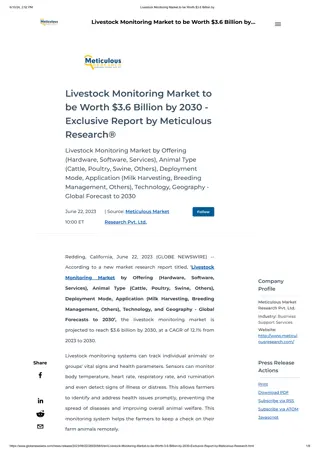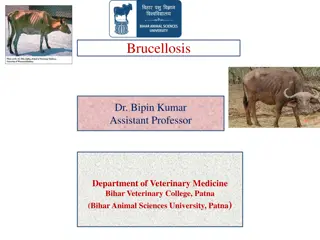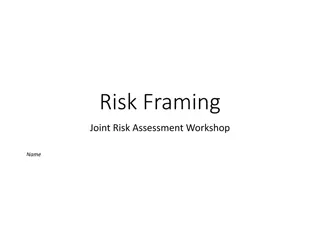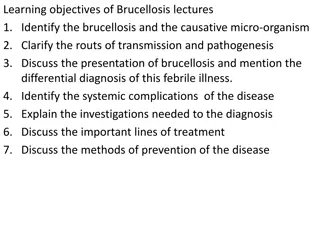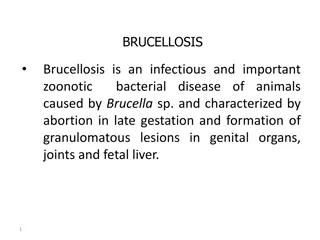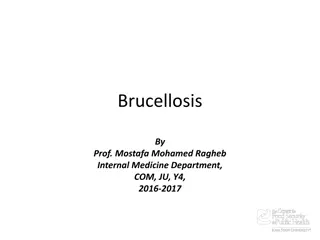Livestock Monitoring Market Trend to be Worth $3.6 Billion by 2030
The early detection of a disease in a population of animals\u2014a herd of cattle, for example\u2014is particularly useful in controlling certain chronic infectious diseases, such as mastitis, brucellosis, and tuberculosis, as well as certain non-infectious diseases, such as bloat. With sensor techn
0 views • 8 slides
Understanding Brucellosis: A Zoonotic Disease Impacting Animals and Humans
Brucellosis, caused by the genus Brucella, is a zoonotic disease affecting animals like goats, sheep, cattle, and humans. It is primarily transmitted through contact with infected animals or ingestion of their products. The disease manifests in various forms like Mediterranean fever and can lead to
0 views • 13 slides
Understanding Impotentia Generandi in Male Animals
Inability or reduced ability to fertilize the ovum due to testicular pathology is known as Impotentia Generandi. It can be associated with abnormal or apparently normal semen production, affecting the fertility of male animals. Conditions such as brucellosis, cryptorchidism, and congenital defects l
0 views • 30 slides
Overview of Brucella Bacteria and Brucellosis Infection
Brucella bacteria are Gram-negative coccobacilli associated with Brucellosis, a disease causing flu-like symptoms in humans. They exhibit specific characteristics, differential tests, and antigenic structures. Infection occurs through various sources like milk, meat, and contact with infected animal
0 views • 13 slides
Understanding Brucellae: Characteristics and Infection Routes
Brucellae are intracellular parasites causing brucellosis in humans, characterized by acute bacteremia followed by a chronic phase. The four zoonotic species are B. melitensis, B. abortus, B. suis, and B. canis. Their morphology, growth characteristics, antigenic structure, and common infection rout
0 views • 18 slides
Common Infective Diseases in Cattle and Their Implications
Infective diseases such as blackquarter, brucellosis, and foot and mouth disease pose significant threats to cattle health and food safety. Blackquarter is a fatal disease caused by Clostridium chauvaei, while brucellosis leads to contagious abortion in cattle. Foot and mouth disease is highly conta
0 views • 17 slides
Understanding One Health Approach for Food Security and Public Health
The concept of One Health emphasizes the interconnectedness of human, animal, and environmental health. This approach explores how animal-borne illnesses impact food security, public health, and overall well-being. By examining diseases like avian influenza, Newcastle disease, and brucellosis, we se
0 views • 15 slides
Risk Framing & Joint Risk Assessment Workshop for Hazard Identification
This workshop focuses on identifying hazards and risks related to pathogens, like Brucellosis, in a country. It includes reviewing disease situations in humans, animals, and the environment. The government's top concern is highlighted, and the scope and purpose of the assessment are discussed. The o
0 views • 16 slides
Fever Associations and Clinical Presentations in Tropical Medicine and Gastroenterology
This presentation by Dr. Amr Ahmed Hamed, a lecturer at Sohag University, explores various fever associations and clinical presentations related to tropical medicine and gastroenterology. Topics covered include fever with jaundice, sweating, rigors, hepatomegaly, splenomegaly, rash, lymphadenopathy,
0 views • 25 slides
Comprehensive Overview of Brucellosis: Causes, Transmission, Diagnosis, and Treatment
Brucellosis, also known as Malta fever or Mediterranean fever, is a systemic bacterial infection caused by Brucella species. This overview covers the identification of the disease, its transmission methods, clinical presentation, complications, diagnostic investigations, treatment options, and preve
0 views • 12 slides
Brucellosis in Cattle and Buffaloes in Bikaner, Rajasthan, India
Brucellosis, caused by Brucella abortus, is a serious disease in cattle and buffaloes with significant public health and trade consequences. The disease is prevalent in India and poses a substantial economic impact. WHO recognizes brucellosis as a zoonotic disease, affecting both animals and humans.
0 views • 17 slides
Understanding Brucellosis: Causes, Transmission, and Control
Brucellosis is an infectious zoonotic bacterial disease affecting animals, characterized by abortion and granulomatous lesions. It is caused by Brucella species and has a rich history of discovery. The disease has multiple species with varying pathogenic strains and vaccines. Brucellosis has resista
0 views • 24 slides
Understanding Brucellosis: Causes, Symptoms, Diagnosis, and Treatment
Brucellosis, also known as Undulant Fever or Malta Fever, is a zoonotic disease caused by Brucella spp. Learn about its etiology, transmission, manifestations, diagnosis, treatment, and preventive aspects. Discover the history of Brucellosis and populations at risk. Explore the epidemiology, includi
0 views • 44 slides
